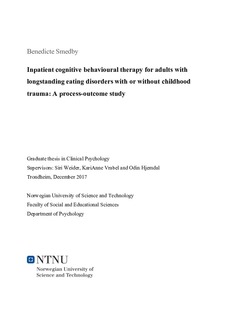| dc.description.abstract | Background: There is convincing evidence for cognitive behavioural therapy (CBT) as the most effective treatment for eating disorders (EDs). However, research shows that a large portion of the patients do not respond to the treatment. Why some patients benefit from the treatment while others do not, is not clear. Childhood trauma has been suggested as predictor for a nonfavourable outcome. Additionally, the clinical view of many professionals is that CBT has limited effect in more complex cases.
Methods: This study examined the outcome and process of transdiagnostic inpatient CBT for EDs in 48 patients with longstanding EDs with or without childhood trauma. The course and outcome were assessed comparing the patients’ scores on questionnaires measuring ED symptoms, depression, trauma and psychosocial impairment at four times of measurement: preevaluation, admission, discharge and at one-year follow-up. Patients with and without trauma were compared, to assess differences between the groups in course and outcome. These analyses were performed using mixed-model- and repeated-measures ANOVAs, supplemented by clinical significant change and effect sizes. The treatment process was investigated using weekly measures, allowing examination if one specific variable predicted ED symptoms over time and if changes in a variable one week predicted changes in ED symptoms the following week. The possible predictors, cognitions and alliance, were assessed using multilevel mixed model analyses.
Results and conclusion: Results support the effectiveness of CBT for longstanding EDs. The trauma group reported higher levels of symptoms than the non-trauma group at all times of measurement, although only a significant difference was found in depression. The results indicated no differences in course between the groups. General and specific problematic cognitions and alliance predicted levels of ED symptoms throughout the treatment. Changes on the alliance subscales ‘agreement on goals’ or ‘agreement on tasks’ for a particular patient one week, predicted changes in ED symptoms the following week. | nb_NO |
